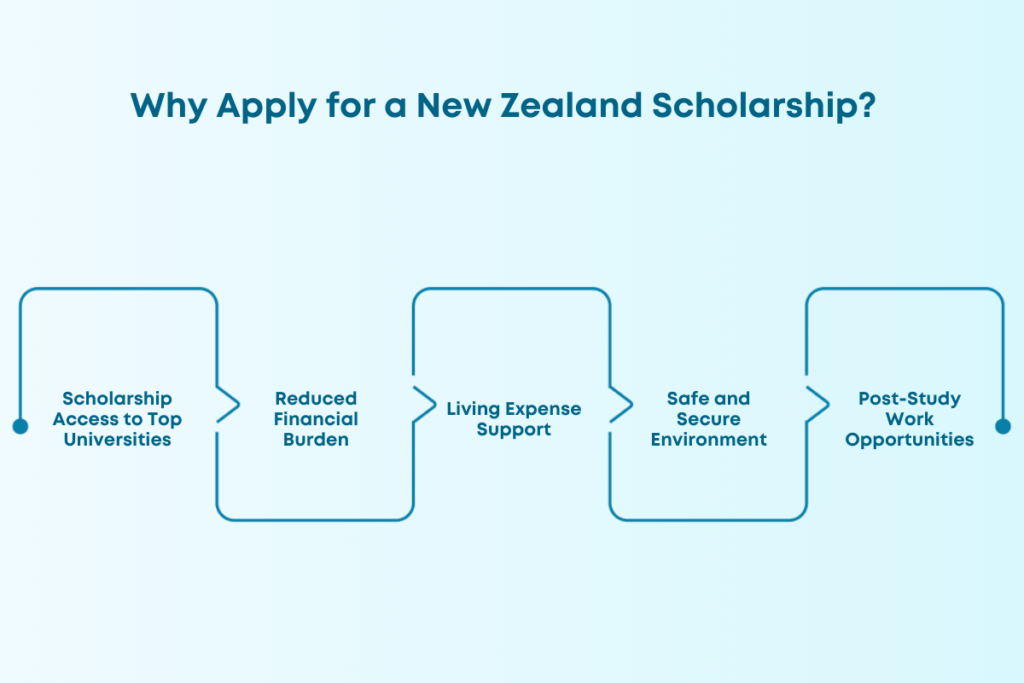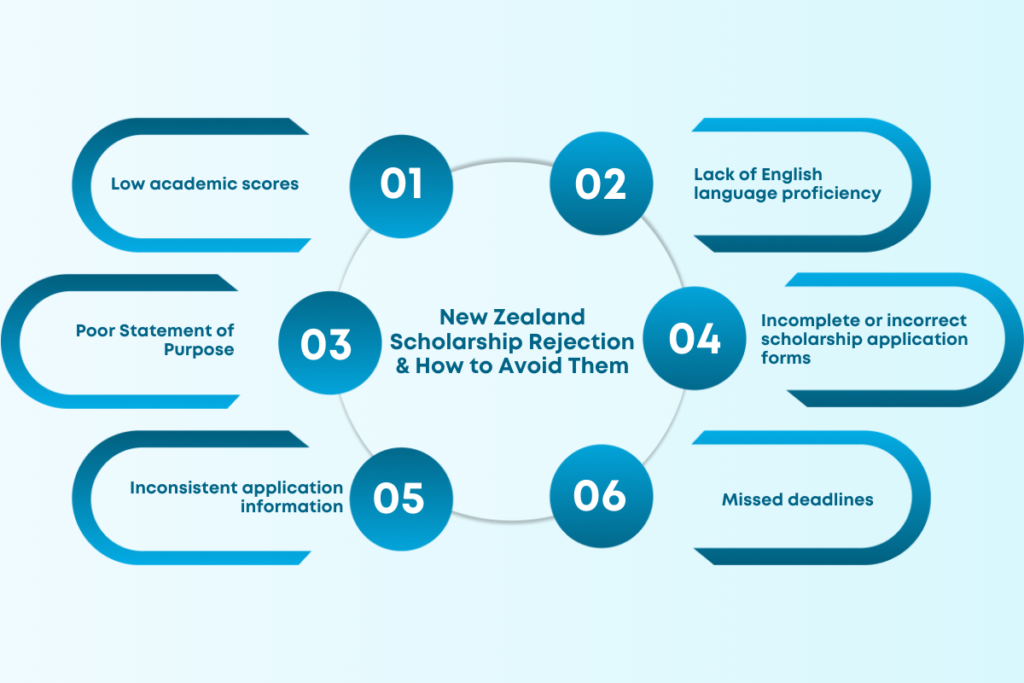In the previous year, New Zealand welcomed over 69,000 international students, including 1600 Indian students. Among these, Indian students played a pivotal role, contributing significantly to the rising numbers and reinforcing their position as one of the top source markets alongside China.
This surge in diversity reflects New Zealand’s global appeal as a safe, welcoming, and high-quality education hub. Universities contribute to this significantly, with international student numbers showing a 67% growth.
For Indian students, New Zealand offers world-class education with scholarships designed to make studying abroad more accessible. New Zealand scholarships for international students cater to undergraduate, postgraduate, and doctoral programs, reducing financial barriers while providing opportunities for professional growth.
Let’s explore the different types of scholarships in New Zealand for Indian Students, the cost of studying, eligibility, and how to get a scholarship to study in New Zealand.
Why Apply for a New Zealand Scholarship?
Choose your dream country
When do you want to study abroad?
What's your highest level of education?
Select you current city
How Leap will help you
Personalised University Shortlist
Express Applications with Quicker Admits
End-to-End Application Support
New Zealand has welcomed 73,345 international students from January to August 2024.
The growing popularity of pursuing an education in New Zealand among Indian students can be attributed to a number of factors. Here are some benefits of studying in New Zealand for Indian students:

- Scholarship Access to Top Universities: New Zealand offers high-quality education with globally recognised degrees comparable to those from the US, UK, Australia, and Canada. Many New Zealand scholarships cover tuition fees, allowing Indian students to study at world-renowned universities, including those ranked in the top 3% by QS.
- Reduced Financial Burden: Scholarships can significantly lower education costs by covering tuition fees, living expenses, and other study-related costs, making New Zealand a more affordable study destination.
- Living Expense Support: Some scholarships offer stipends to cover living costs, ensuring students can focus on academics without financial stress.
- Safe and Secure Environment: New Zealand has low crime rates and a politically stable climate, hence a secure destination for foreign students.
- Post-Study Work Opportunities: After completing their studies, students can stay in New Zealand for work or further education, with pathways to permanent residency.
Also Read: Study in New Zealand
Cost of Studying vs. Scholarship Opportunities in New Zealand
Studying in New Zealand offers access to world-class education. However, scholarships play a crucial role in offsetting these costs. The average cost of studying in New Zealand is:
| Expenses | Cost |
|---|---|
| Tuition Fees | NZD 20,000–NZD 40,000 per year, or INR 9.9L -19L |
| Living expenses | NZD 15,000–NZD 20,000 per year or INR 7.45L- 19L |
| Total annual cost | NZD 35,000–NZD 60,000 or INR 17L to 29L |
Since scholarships fund your education and, in some cases, cover travel and living expenses, you can recover a significant portion of your cost of living through New Zealand universities’ scholarship for international students:
| Type of Scholarship | Average Costs Covered |
|---|---|
| New Zealand scholarships for undergraduate | Up to NZD 10,000–NZD 20,000 or INR 4.9L to INR 9.9L |
| New Zealand scholarships for master degree | Up to NZD 5,000–NZD 20,000 or -INR 2.4L INR 9.9L |
| New Zealand scholarships for PhD Studies | Up to NZD 25,000 or INR 12L |
Also Read: Cost of Studying in New Zealand
Types of New Zealand Scholarships for Indian Students
Before applying for the New Zealand Scholarship, make sure you meet the eligibility criteria, which may be based on your chosen destination, subject, extracurricular activities, volunteering, or academic level. While certain scholarships require only an application, others may include additional requirements such as written assignments.
New Zealand offers a range of scholarships for Indian students, making quality education more accessible. Based on funding coverage, they can be divided into two main categories:
- Fully Funded Scholarships: Full scholarships in New Zealand for international students cover all costs associated with studying, such as tuition fees, medical expenses, and other expenses, to provide total financial support. The Manaaki New Zealand scholarship is a government-backed, fully funded scholarship.
- Partially Funded Scholarships: Some scholarships only cover a portion of the costs, such as tuition fees or support for doctoral research. An example of a partially funded scholarship is the New Zealand International Doctoral Research Scholarship (NZIDRS).
Based on the funding source, scholarships can also be classified as :
- Government Funded Scholarships: The New Zealand government funds multiple scholarships for Indian students to encourage them to study in New Zealand. Although getting a government-funded scholarship is more competitive comparatively, it is a very convenient choice. The New Zealand government funds the New Zealand Commonwealth Scholarships for students belonging to Commonwealth countries such as India.
- University Funded Scholarships: The major universities in New Zealand also fund several scholarships. The University of Waikato and the University of Auckland are some of the institutes that fund scholarships for specific courses.
Now, let us look at some of the major scholarships for Indian students.
Top 10 New Zealand Scholarships for Indian Students
Securing a scholarship for studying in NZ is a valuable opportunity that recognises academic merit, leadership potential, and career aspirations.
Below are the top 10 New Zealand scholarships that you must consider:
| New Zealand Scholarship for Indian students | Funding Body | Amount Covered (NZD / INR) |
|---|---|---|
| New Zealand Commonwealth Scholarships | New Zealand Government | NZD 491/week (INR 24,240) + NZD 3,000 (INR 149,209) |
| New Zealand International Doctoral Research Scholarships (NZIDRS) | New Zealand Government | NZD 25,000/year (INR 1,243,156) + NZD 600 (INR 29,843) |
| Manaaki New Zealand Scholarships | New Zealand Government | Full financial support (tuition, living, travel) |
| New Zealand International Scholarships | New Zealand Government | Tuition, living expenses, travel costs |
| University of Waikato Vice Chancellor's International Excellence Scholarship | University of Waikato | Up to NZD 15,000 (INR 745,850) |
| University of Auckland International Student Excellence Scholarship | University of Auckland | Up to NZD 20,000 (INR 994,290) |
| Lincoln University Undergraduate Vice-Chancellor's Scholarship | Lincoln University | NZD 5,000 (INR 248,758) |
| Lincoln University International School Leavers Scholarship | Lincoln University | Up to NZD 10,000 (INR 497,228) |
| University of Otago Global Undergraduate Scholarships | University of Otago | NZD 10,000 (INR 497,228) |
| New Zealand Excellence Awards (NZEA) | Various New Zealand Universities | NZD 10,000–20,000 (INR 497,228–994,290) |
Also Read: Scholarships for Indian Students to Study in New Zealand
Eligibility Criteria for New Zealand Scholarships
New Zealand attracts a talent pool of highly skilled students. The country ranks 7th in the world’s highest-performing graduates, so all scholarships are competitive.
Each scholarship has specific eligibility criteria based on academic merit, financial need, English language proficiency, and other factors. Below is a detailed breakdown:
Undergraduate Scholarships
- High school diploma
- Minimum GPA of 3.0+
- English Language Requirements: IELTS 6.0+ / TOEFL iBT 90–100+
Master’s Scholarships
- Bachelor’s degree
- Minimum GPA of 3.5+
- Research proposal (if applicable)
- English Language Requirements: IELTS 6.5+ / TOEFL iBT 90–100+
Additional Requirements:
- Proof of Financial Need: Bank statements, income certificates, tax returns
- Funding Documentation for Visa: Proof of funds covering living expenses (NZD 15,000–20,000 per year | INR 7.45L–9.9L)
How to Apply for a New Zealand Scholarship?
Applying for a New Zealand scholarship is a competitive process that requires careful preparation. Experts recommend starting early, as deadlines vary, and ensuring your application highlights not just your academic achievements but also your overall capabilities.
Here’s how you can apply:
- Identify scholarships that match your background, field of study, and financial needs.
- Gather Documents. Commonly required documents are:
- Academic transcripts
- Letters of recommendation
- Statement of purpose
- English proficiency test results (e.g., IELTS/TOEFL)
- Proof of financial need (if required)
- Register on the official scholarship portal or the university’s scholarship website.
- Submit the New Zealand scholarship application form and wait for the Results.
- Accept the Scholarship Offer.
When to Apply for Scholarship in New Zealand?
By applying well within the deadline, you can have better chances of getting financial assistance. Knowing when to apply for a New Zealand scholarship is crucial to increasing the approval rate.
- Start early: Deadlines are usually 6 to 12 months before your course begins, so research at least a year in advance.
- University applications matter: Many scholarships require an offer of admission, so plan around the February and July intakes.
- Government & private scholarships: Govt-funded scholarships typically close between March and July, while private ones vary—check their websites.
- Competitive scholarships: Some have multiple selection rounds, requiring essays, recommendations, or interviews—apply early.
- Track deadlines: Keep a checklist to stay on top of key dates.
Also Read: Top Universities in New Zealand
Important Deadlines for New Zealand Scholarships in 2025
Scholarships have different deadlines depending on the intake and the university. Here are the deadlines for major scholarships:
| Name of Scholarship | Deadline |
|---|---|
| Manaaki New Zealand Scholarships | 28 February 2025 |
| University of Auckland International Student Excellence Scholarship | 24 October 2024 (1st round)1 April 2025 (2nd round) |
| Tongarewa Scholarship at Victoria University of Wellington | 1 May 2025 (Trimester 2)1 August 2025 (Trimester 3) |
| New Zealand Commonwealth Scholarships | 15 January 2025 |
| New Zealand International Doctoral Research Scholarships (NZIDRS) | 15 July 2025 |
| University of Waikato Vice Chancellor's International Excellence Scholarship | 31 Dec 2025 |
| Lincoln University Undergraduate Vice-Chancellor's Scholarship | 31 January 2025 |
| University of Otago Global Undergraduate Scholarships | 10 December for semester 1 (February) start30 April for semester 2 (July) start for offshore students15 August for onshore students |
| New Zealand Excellence Awards (NZEA) | 15 October 2024 for semester 2 |
Common Reasons for New Zealand Scholarship Rejection & How to Avoid Them
Now that you know how to apply for a New Zealand scholarship, let’s look at the common reasons for the rejection of scholarships in New Zealand and how you can avoid them.

- Low academic scores and eligibility issues can arise from an inadequate academic background. This typically happens when a student has poor grades or inconsistent academic performance. Since most scholarships are merit-based, it’s crucial to maintain a good academic score consistently.
- Another issue that can arise is the lack of English language proficiency. If you fail to meet the English proficiency requirements set by the scholarship provider, it may impact your chances of success.
- A poor Statement of Purpose (SOP) is another common reason for rejection. An unclear or weak SOP that fails to justify your study goals can hinder your chances. To avoid this, write a clear and compelling SOP that explains why you want to pursue the course in New Zealand and how it aligns with your career goals. You can also get your SOPs reviewed by experts.
- Incomplete or incorrect scholarship application forms and insufficient documentation are also common reasons for rejection. To avoid this, carefully review the application checklist and ensure all documents are accurate and complete.
- Inconsistent application information is another pitfall. Inconsistent information in your scholarship application, such as mismatched personal details or academic records, can lead to delays or rejection. To avoid this, carefully review all documents and ensure that every detail is accurate and consistent across your application and supporting materials.
- Missed deadlines can significantly impact your chances of receiving a scholarship. Submitting your application late can decrease your chances of getting financial aid by 50%.
New Zealand offers several scholarship programs for Indian students, making the country a very desirable destination for higher studies. You can increase the chances of approval of your scholarship by thoroughly researching the scholarship and applying well before the deadline. Apply for a New Zealand scholarship today and begin your journey with Leap!
Frequently Asked Questions
-
Q. How can I get a full scholarship in New Zealand?
A. To secure a full scholarship in New Zealand for international students, such as the Manaaki New Zealand Scholarship, focus on academic excellence, leadership potential, and financial need. Research scholarships and complete the New Zealand scholarship eligibility test. Submit a strong application before the deadline.
-
Q. Is New Zealand good for Indian students?
A. Yes, New Zealand scholarships for Indian students make it an excellent destination. With world-class universities offering programs across disciplines, Indian students benefit from many scholarships, post-study work opportunities, and a culturally inclusive environment.
-
Q. Can I study in New Zealand for free?
A. While studying entirely for free is rare, New Zealand scholarships for Indian students, such as the Manaaki Scholarship or New Zealand International Doctoral Research Scholarships (NZIDRS), cover tuition fees, living costs, and travel expenses, enabling eligible students to study without financial burden.
-
Q. Who is eligible for the New Zealand Commonwealth Scholarship?
A. The New Zealand Commonwealth Scholarship is for students from developing Commonwealth countries with strong academic records. Applicants must hold a bachelor’s degree, meet English proficiency requirements (IELTS 6.5+), and commit to returning to their home country after completing their studies.
-
Q. How much money is required to study in New Zealand from India?
A. Indian students typically need NZD 20K–45K or INR 9.9L to INR 22L annually for tuition fees and NZD 15K–20K or INR 7L to 9.9L for living expenses. Applying for New Zealand scholarships for Indian students, such as the New Zealand Excellence Awards (NZEA) or university-specific awards, can significantly reduce these costs.
-
Q. What are the disadvantages of studying in New Zealand?
A. Disadvantages include high tuition fees without scholarships, limited university options compared to larger countries, and fewer job opportunities in niche fields. However, programs like New Zealand government scholarships for international students can mitigate financial challenges.
-
Q. What are the types of scholarships available for international students to study in New Zealand?
A. Scholarships include government-funded options like the Manaaki New Zealand Scholarship and New Zealand International Scholarship, university-specific awards such as the University of Auckland Excellence Scholarship, and field-specific grants like those for science and technology disciplines.
-
Q. What are the eligibility criteria to apply for scholarships in New Zealand?
A. Eligibility varies but generally includes academic excellence (70%+ scores), English proficiency (IELTS/TOEFL), financial need (for some programs), and alignment with scholarship goals. Specific criteria depend on whether you’re applying for a New Zealand master's scholarship for international students or undergraduate funding.
-
Q. When is the best time to apply for scholarships in New Zealand?
A. The ideal time is 6–12 months before your intended start date. For instance, applications for fully funded scholarships in New Zealand like Manaaki Scholarships open in February each year. Start early to meet deadlines and prepare your documents.
-
Q. Are there specific New Zealand master’s scholarships for international students?
A. Yes, programs like the New Zealand Excellence Awards (NZEA) specifically target master’s students. Additionally, research-based grants such as NZIDRS support postgraduate studies with full tuition coverage and living stipends.
-
Q. Are there fully funded scholarships in New Zealand for international students?
A. Yes, options like the Manaaki Scholarship or NZIDRS offer fully funded scholarships in New Zealand, covering tuition fees, living allowances (up to NZD 25K or INR 12L annually), travel costs, and health insurance.















Have Questions? Get Guidance to reach your Dream University
Connect with India's finest counsellors and biggest study abroad community.
Get Guidance